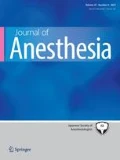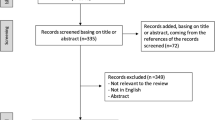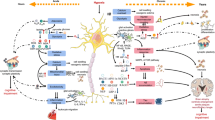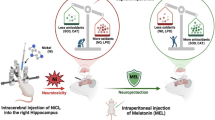Abstract
Objective
At present, the harm of hypothermia to the central nervous system has received a great attention from scholars. The present study aimed to investigate the effects of hypothermia on learning and memory abilities and hippocampal apoptosis in neonatal rats and the role of p-ERK and p-CREB in anesthesia.
Methods
In this study, 60 Sprague Dawley newborn rats (age 7-day-old) were randomly divided into 3 groups (n = 20), including Control Group (Group C), Anesthesia Group (Group A), and Anesthesia Hypothermia Group (Group AH). Group C was intraperitoneally injected with 0.1 ml saline, and rectal temperature was maintained in the range of 38–39 °C; Group A was intraperitoneally injected with 25 mg/kg of propofol (0.1 ml), the 1/2 initial dose was added per each period of 20 min, anesthesia was maintained for 2 h, and rectal temperature was kept in the range of 38–39 °C. The anesthesia mode and duration of Group AH were as same as Group A, room temperature was set to 23 °C, which caused body’s temperature naturally dropped down. After the anesthesia recovered, each group randomly involved five rats for analyzing by Western blot to detect the expression level of p-ERK and p-CREB, and other five rates were also analyzed by flow cytometry assay to detect hippocampal apoptosis rate. The remaining 10 rats in each group were kept up to 30 days for conducting the Morris water maze test, five rats were tested for detecting the expression level of p-ERK and p-CREB, as well as hippocampal apoptosis rate in each group.
Results
Compared with Group C and Group A, the rectal temperature of Group AH was decreased significantly (P < 0.05); At the age of 7 days, compared with Group C and Group A, apoptosis rate of hippocampal tissue in Group AH was increased (P < 0.05), the expression level of p-ERK and p-CREB proteins in Group AH was significantly reduced (P < 0.05), and there were no significant differences between Group C and Group A. At the age of 36 days, there were no significant differences in the results of behavioral test, apoptotic rates, and expression level of the proteins.
Conclusion
Our findings suggest that hypothermia during anesthesia can increase the apoptosis rate in the hippocampus of neonatal rats, whose mechanism may be related to the downward adjustment of p-ERK and p-CREB. However, it has no obvious influence on the long-term learning and memory abilities.






Similar content being viewed by others
References
Li HL, Zhu SJ, Xiong JM, Chen S, Xuan Y. Research of temperature protection strategy of precaution hypothermia in infant patients after general anesthesia. Xinjiang Med J. 2016;46(6):616–8 (Article in Chinese).
Fu J, Liu CP, Zhang ZW, Xing MW, Xu SW. Influence of inflammatory pathway markers on oxidative stress induced by cold stress in intestine of quails. Res Vet Sci. 2013;95(2):495–501.
Liu Y, Liu Y, Jin H, Cong P, Zhang Y, Tong C, Shi X, Liu X, Tong Z, Shi L, Hou M. Cold stress-induced brain injury regulates TRPV1 channels and the PI3K/AKT signaling pathway. Brain Res. 2017;1670(1):201–7.
Qu TT, Deng JX, Li RL, Cui ZJ, Wang XQ, Wang L, Deng JB. Stress injuries and autophagy in mouse hippocampus after chronic cold exposure. Neural Regen Res. 2017;12(3):440–6.
Jie L, Su M, Ke W, Cao J, Wang B, Ping L, Jun D, Liu YY. Propofol prevents electroconvulsive-shock-induced memory impairment through regulation of hippocampal synaptic plasticity in a rat model of depression. Neuropsychiatr Dis Treat. 2014;10(1):1847–59.
Kim MK, Park GH, Eo HJ, Song HM, Lee JW, Kwon MJ, Koo JS, Jeong JB. Tanshinone i induces cyclin d1 proteasomal degradation in an ERK1/2 dependent way in human colorectal cancer cells. Fitoterapia. 2015;101(1):162–8.
Zhu YP, Xi SH, Li MY, Ding TT, Liu N, Cao FY, Zeng Y, Liu XJ, Tong JW, Jiang SF. Fluoride and arsenic exposure affects spatial memory and activates the ERK/CREB signaling pathway in offspring rats. Neurotoxicology. 2017;59(1):56–64.
Zhang F, Zhu Q, Xue Q, Luo Y, Yu B. Extra-cellular signal-regulated kinase (ERK) is inactivated associating hippocampal arc protein up-regulation in sevoflurane induced bidirectional regulation of memory. Neurochem Res. 2013;38(7):1341–7.
Wang B, Zhao JH, Yu M, Meng X, Cui X, Zhao Y, Zhu YY, Xing W, Guan YF. Disturbance of Intracellular calcium homeostasis and CaMKII/CREB signaling is associated with learning and memory impairments induced by chronic aluminum exposure. Neurotox Res. 2014;26(1):52–63.
Zhang Y, Chen P, Zheng LM. Effects of propofol on ERK1, ERK2 and CREB phosphorylation in hippocampal in rats. Chin J Lab Diagn. 2010;14(4):520–3 (Article in Chinese).
Istaphanous GK, Loepke AW. General anesthetics and the developing brain. Curr Opin Anaesthesiol. 2009;22(3):368–73.
Dobbing J, Sands J. Comparative aspects of the brain growth spurt. Early Human Dev. 1979;3(1):79–83.
Whittington RA, Bretteville A, Virág L, Emala CW, Maurin TO, Marcouiller F, Julien C, Petry FR, El-Khoury NB, Morin F, Charron J, Planel E. Anesthesia-induced hypothermia mediates decreased arc gene and protein expression through ERK/MAPK inactivation. Sci Rep. 2013;3(9):1388.
Zhang YG, Wei J. Relationship between hypothermia and heart rate variability, blood pressure variability. Chin J Pathophysiol. 2007;23(10):1906–8 (Article in Chinese).
Chi QS, Wang DH. Postnatal development of thermoregulation in altricial mammals. Chin J Zool. 2005;40(6):137–43 (Article in Chinese).
Ma JL, Zheng G, Sheng XF, Zhan WB, Wang JY, Che XJ, Chen YM, Meng SS, Chen JY. Cold stress-induced impairment of learning and memory of rats and its mechanism. Progress Mod Biomed. 2009;9(24):4615–7 (Article in Chinese).
Han YM, Zhang CZ, Lin L, Chen L. Effects of low temperature on functions of learning, memory and activities of ATPase in brain tissue of mice. Chin J Ind Hyg Occup Dis. 2009;27(3):129.
Chang SJ, Wang TY, Lee YH, Tai CJ. Extracellular ATP activates nuclear translocation of ERK1/2 leading to the induction of matrix metalloproteinases expression in human endometrial stromal cells. J Endocrinol. 2007;193(3):393–404.
Liu CM, Ma JQ, Sun JM, Feng ZJ, Cheng C, Yang W, Jiang H. Association of changes in ER stress-mediated signaling pathway with lead-induced insulin resistance and apoptosis in rats and their prevention by A-type dimeric epigallocatechin-3-gallate. Food Chem Toxicol. 2017;110(1):325–32.
Holscher C, Van AL, Sutherland C. Anaesthesia generates neuronal insulin resistance by inducing hypothermia. BMC Neuroscience. 2008;9(1):1–7.
Kielian T, Esen N. Effects of neuroinflammation on glia-glia gap junctional intercellular communication: a perspective. Neurochem Int. 2016;45(2):429–36.
Cattano D, Young C, Straiko MM, Olney JW. Subanesthetic dose of propofol induce neuroapoptosis in the infant mouse brain. Anesth Analg. 2008;106(6):1712–4.
Kato R, Tachibana K, Uchida Y, Hashimoto T, Takita K, Morimoto Y. Neonatal anesthesia causes long-term disturbances of hippocampal synaptic plasticity. J Jpn Soc Clin Anesthesia. 2014;34(1):018–24.
Tan W, Cao X, Wang J, Lv H, Wu B, Ma H. Tau hyperphosphorylation is associated with memory impairment after exposure to 1.5% isoflurane without temperature maintenance in rats. Eur J Anaesthesiol. 2010;27(9):835–41.
Acknowledgements
This work was supported by Guizhou Provincial Science and Technology Agency, Affiliated Hospital of Guizhou Medical University (Grant No. LH[2017]7202).
Author information
Authors and Affiliations
Corresponding authors
About this article
Cite this article
Liu, W., Tan, X., Xiong, X. et al. Effects of hypothermia during propofol anesthesia on learning and memory ability and hippocampal apoptosis in neonatal rats. J Anesth 33, 9–16 (2019). https://doi.org/10.1007/s00540-018-2576-7
Received:
Accepted:
Published:
Issue Date:
DOI: https://doi.org/10.1007/s00540-018-2576-7




